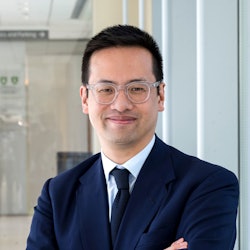A remedy worth fighting for
One urologist’s mission to treat prostate cancer collectively and equitably.

Saturday morning’s Plenary Session features the powerful work and message of Quoc-Dien Trinh, MD, MBA. In The Journal of Urology® Lecture, “Empowering Communities: Fostering Prostate Cancer Awareness and Resilience Among Men of Color,” Dr. Trinh will share prostate cancer mortality rates and examine the considerable inequities found in minority male populations—most notably inadequate health care access and awareness.
Dr. Trinh is the chief of urology at Brigham and Women’s Faulkner Hospital and associate professor of surgery at Harvard Medical School in Boston. He is also a full-time advocate for community engagement programs that will help eradicate these disparities to help equalize and improve patient outcomes.
Before his lecture, AUA Daily News caught up with Dr. Trinh to learn more about his personal and professional ambitions regarding this important issue.
You have done a lot of research on health equity. What draws you to this topic, and why is it so important, in your opinion?
Dr. Trinh: My upbringing in Canada with Vietnamese refugee parents exposed me to a society that valued equal access to education and health care. Upon relocating to the U.S., I was struck by the stark contrasts in access to these essentials. This experience ignited my passion for health equity over the past decade and fueled my commitment to effecting change in this area.
What are some of the biggest disparities you’ve uncovered in the field of urology?
Dr. Trinh: I'm very specialized as a urologic oncologist in prostate cancer, so [it’s] hard to comment on the field more broadly, but I find it disconcerting how men of color are less likely to receive treatment for prostate cancer, even when they have a significant disease that we would all agree requires treatment.
What evidence have you found in your work that supports promoting prostate cancer awareness among certain populations and communities?
Dr. Trinh: Our work, through my involvement with the Prostate Cancer Workgroup at the Massachusetts Department of Public Health, most recently funded by the American Cancer Society, has shown that, regardless of what angle or who you talk to, prostate cancer awareness among men of color remains an issue, and we need to do better to bring communities together in partnership with health care institutions if we wish to make a difference.
You have poured yourself into the Prostate Cancer Outreach Clinic that you co-founded. What have you learned in establishing the clinic, and how has it changed your perspective on practicing health care?
Dr. Trinh: Establishing the clinic has been enlightening on several fronts, particularly in understanding the deep-seated mistrust between communities of color and large health care institutions. It has also highlighted the fragmented nature of disparity mitigation efforts across various entities. These experiences have reinforced the necessity of a united approach and the critical role of diversity within the health care workforce to foster meaningful change.
What are the primary messages you hope AUA members take away from your presentation and put into action?
Dr. Trinh: Beyond the realms of research and policy, it is clear that grassroots movements are essential to address health equity effectively. I encourage AUA members to actively engage in these efforts to make a tangible difference in our communities.